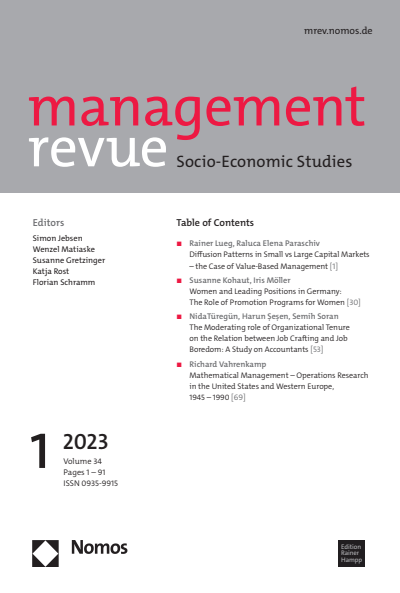精神作为COVID-19大流行负面影响与生活和工作满意度之间的缓冲?
IF 1.7
0 MANAGEMENT
引用次数: 0
摘要
COVID-19大流行对员工产生了各种各样的影响,对他们的工作和个人生活产生了负面影响。根据之前的研究,灵性帮助人们应对与不确定性和不确定性相关的负面生活事件。我们调查了工作中的灵性是否调节了流行病的负面后果与工作和生活满意度之间的关系。在德国进行的一项大规模两波小组研究中(2019年12月至11月和2020年6月至7月),参与者接受了疫情对个人负面影响的严重程度、他们的工作和生活满意度以及他们在工作中的精神状态的调查。结果显示,工作和生活满意度与疫情的负面影响呈负相关。工作中的精神性显著调节了消极后果与生活满意度和工作满意度之间的关系。然而,对工作满意度模型的调节作用仅呈弱显著性。因此,在疫情改变(工作)生活的情况下,在工作中保持高度精神状态可以帮助人们应对负面后果,缓冲其对工作和生活满意度的影响。雇主可以通过人力资源管理促进和支持工作中的精神,从而帮助维持或加强员工的幸福感。本文章由计算机程序翻译,如有差异,请以英文原文为准。
Spirituality as a Buffer Between Negative Effects of the COVID-19 Pandemic and Life as Well as Job Satisfaction?
The COVID-19 pandemic has various consequences on employees that negatively affect their work and personal lives. According to previous research, spirituality helps one to cope with negative life events relating to uncertainty and Unverfügbarbeit. We investigate whether spirituality at work moderates the relationship between the pandemic's negative consequences and both job and life satisfaction. In a large-scale two-wave panel study with 1,468 participants (December to November 2019 and June to July 2020) in Germany, participants were surveyed for the severity of individual negative consequences of the pandemic, their job and life satisfaction, and their spirituality at work. The results show that job and life satisfaction are negatively related to the pandemic's negative consequences. Spirituality at work significantly moderates the relationship between negative consequences and life satisfaction as well as job satisfaction. However, the moderation effect on the job satisfaction model is only weakly significant. Thus, within the (work) life-changing circumstances of the pandemic, high spirituality at work can help one to cope with the negative consequences, buffering their impacts on job and life satisfaction. Employers can help to maintain or strengthen their employees' well-being by facilitating and supporting spirituality at work via HRM.
求助全文
通过发布文献求助,成功后即可免费获取论文全文。
去求助
来源期刊

Management Revue
MANAGEMENT-
CiteScore
1.20
自引率
0.00%
发文量
7
期刊介绍:
Management Revue - Socio-Economic Studies is an interdisciplinary European journal that undergoes peer review. It publishes qualitative and quantitative work, along with purely theoretical papers, contributing to the study of management, organization, and industrial relations. The journal welcomes contributions from various disciplines, including business and public administration, organizational behavior, economics, sociology, and psychology. Regular features include reviews of books relevant to management and organization studies.
Special issues provide a unique perspective on specific research fields. Organized by selected guest editors, each special issue includes at least two overview articles from leaders in the field, along with at least three new empirical papers and up to ten book reviews related to the topic.
The journal aims to offer in-depth insights into selected research topics, presenting potentially controversial perspectives, new theoretical insights, valuable empirical analysis, and brief reviews of key publications. Its objective is to establish Management Revue - Socio-Economic Studies as a top-quality symposium journal for the international academic community.
 求助内容:
求助内容: 应助结果提醒方式:
应助结果提醒方式:


